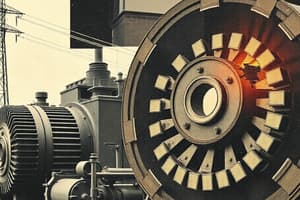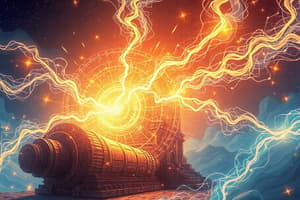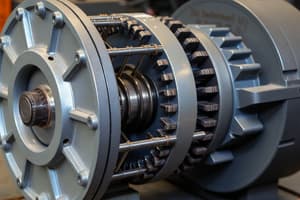Podcast
Questions and Answers
What is the function of a DC generator?
What is the function of a DC generator?
- To store electrical energy
- To convert electrical energy into mechanical energy
- To regulate electrical voltage
- To convert mechanical energy into electrical energy (correct)
In a DC generator, what is the role of the commutator?
In a DC generator, what is the role of the commutator?
- To regulate the electrical output
- To control the speed of rotation
- To reverse the direction of current flow (correct)
- To convert AC to DC
What happens if the field winding in a DC generator is open-circuited?
What happens if the field winding in a DC generator is open-circuited?
- The generator will produce no output power (correct)
- The generator will produce regulated output power
- The generator will produce excessive output power
- The generator will reverse the current flow
Flashcards are hidden until you start studying
Study Notes
DC Generator Function
- The DC generator converts mechanical energy into direct current (DC) electrical energy.
Commutator Role
- The commutator serves as a mechanical switch that periodically reverses the current direction in the armature windings, allowing the DC generator to produce a unidirectional output.
Field Winding Open-Circuit
- If the field winding in a DC generator is open-circuited, the magnetic field collapses, and the generator stops producing voltage.
Studying That Suits You
Use AI to generate personalized quizzes and flashcards to suit your learning preferences.





